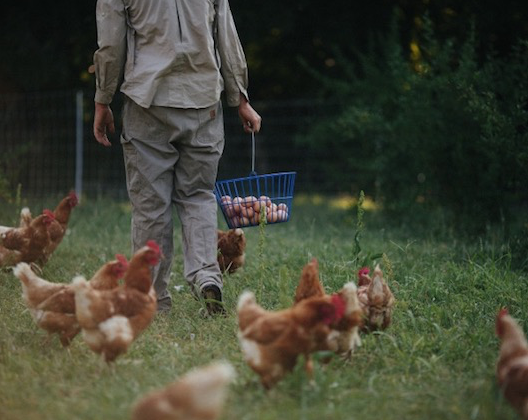
Photo by Diane Rothery Photography.
We recently received a certified letter from the Central Valley Water Board, an agency striving “To preserve, enhance, and restore the quality of California’s water resources…” The Letter states that Full Belly Farm is in violation of the Confined Animals Regulatory Program! Since Full Belly has no confined animals, we had to do some investigation and in a hurry too, because the letter was full of legal Directives and allusions to fines. “Please read this letter carefully” is the first thing it said, and we did!
Our Full Belly Farm egg-laying-hen program is actually something to brag about. We have 3 to 4 groups of hens at any one time, with about 200 layers in each group. They stay in paddocks that are about 25,600 square feet in size. The hens have a movable structure to roost in at night, and every 4 or 5 days, when they’ve eaten the bugs and seeds in their paddock they get to move to a completely new site.
Our system somewhat resembles the way that most chickens were raised before the advent in the 1950’s of the now-dominant confinement method. Today, most chickens are confined indoors in very crowded conditions, with little opportunity to move. 95% of the egg-laying hens in the US are kept in wire battery cages which allow each hen so little space that they can’t do much more than rub against the wires of their cage. One result of this awful situation is high levels of disease so that the chickens have to be fed antibiotics for their entire lives.
Another result of the confinement system is the challenge of managing piles of poop… Because tens of thousands of hens are kept in one stationary facility, their manure builds up quickly. For example, just 10,000 hens will produce a mountain of 440 tons of manure in a year and none of these facilities house just 10,000 hens — they keep at least double or triple that many! It turned out, upon careful re-reading and digestion of our letter, that these many-ton piles of manure were at the crux of the Water Board worry. If those piles of manure (containing traces of antibiotics plus plant nutrients like nitrogen, phosphorus and potassium) weren’t handled properly, things would leach into the groundwater, drain into surface waters, fly off into the air and result in environmental havoc.
At Full Belly, instead of the Water Board nightmare, we have a system which distributes those plant nutrients evenly all over the farm in an environmentally positive manner. Knowing that the nutrient of most concern in California is Nitrogen, which causes nasty problems when it gets into groundwater, we completed the calculation and discovered that less than 6 pounds of Nitrogen per acre were being deposited by our gals as they moved around the farm, and 6 pounds is considerably less than needed to fertilize most crops. It is a quantity of very little environmental concern.
According to Profitable Poultry, a publication of the U.S. Department of Agriculture, this system where the birds are outside and moving all the time, does wonders for soil quality, results in healthier flocks of birds, and eliminates many of the problems created by the confinement system. Many of the water pollution problems associated with livestock in California were created by concentrating too many animals in too small a space for too long. With this in mind, you can imagine, that it really added insult to injury when we realized that the Water Board had determined that stationary facilities that kept all of their animals indoors, with no access whatsoever to pasture, were less “risky” than the facilities that allowed some limited access to the outdoors! This was because any access of the hens to the outdoors results in manure “exposed to the elements.” The Water Board explained that significantly increased fees and reporting requirements would be assessed for any chicken owners that allowed their hens to roam.
This twisted situation could only be the result of policy makers who had never met a chicken! It occurred to us that the Water Board might be overjoyed to find out about the pastured-livestock solutions of hard-working farmers laser-focussed on sustainability, all over the country. So we wrote back with a description of what we were doing. Stay tuned, we invited them on a field trip to the farm in case they were at all interested in chickens. Fees and paperwork notwithstanding, we are sure that this problem can be solved with a delicious omelet made from our organic pastured eggs and a few of our freshly picked vegetables!
—Judith Redmond

Harvesting eggplant
